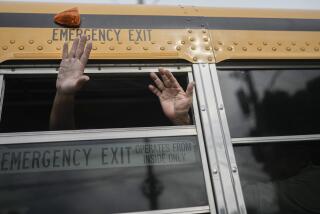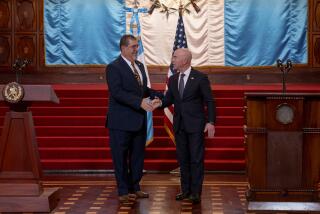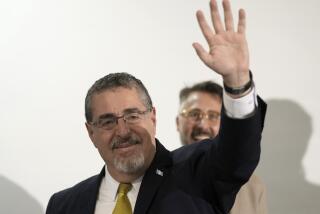Signal of Hope
- Share via
Last week’s inauguration of Vinicio Cerezo as Guatemala’s first civilian president in 16 years sent another hopeful signal from Central America. The signal came in even stronger because the region’s five governments promptly agreed to Cerezo’s proposal to resume peace talks sponsored by the Contadora Group.
The Contadora Group is made up of diplomats from Mexico, Venezuela, Colombia and Panama, and takes its name from the Panamanian island where they first met in 1983 to try to find a negotiated settlement to the guerrilla wars in Central America. Since then, representatives of the Contadora countries have methodically struggled to write a peace treaty that would satisfy not just the Sandinista government in Nicaragua but also Nicaragua’s wary neighbors in El Salvador, Honduras, Costa Rica and Guatemala.
The Contadora process has been close to collapse many times, and all of the countries involved have contributed to the near-breakdowns. Recently the Nicaraguans, frustrated by the lack of progress, asked that the process be halted until next May, when new governments will be in place in Guatemala, Honduras and Costa Rica. That was a mistake, for it created a vacuum during which only military activity continues in the region. As long as shooting continues in Central America, there is a danger that the conflicts there will merge into a regionwide conflagration that would invite military intervention by the United States. That would be a human and diplomatic disaster.
That is why it is so important that foreign ministers of the Central American countries, gathered in Guatemala City for Cerezo’s inauguration, agreed to resume their meetings with the Contadora Group much sooner than May. Equally significant was Cerezo’s decision to sponsor a summit meeting with his fellow Central American presidents at which they can discuss regional problems among themselves. Both steps are needed to keep the Central American situation from deteriorating any further.
That settled, the Contadora process needs one more decision to improve its chance of success. The United States must step back from the Central American crisis long enough to allow the region’s nations to work out their differences among themselves.
The Contadora negotiations would have been difficult under the best of circumstances. But they have been made doubly hard by the Reagan Administration, which gives verbal support to Contadora but does not back up its words with action. If anything, the United States has been hostile to the Contadora Group. By funneling money and arms to the government of El Salvador and to rebels fighting to overthrow the government of Nicaragua, Administration officials have fed the delusionary thinking of Central American leaders who believe that the region’s crises will be settled militarily.
We attribute this heavy-handed approach to the paranoia of right-wing ideologues in the Administration who fear leftist revolution in Nicaragua and El Salvador but can think of no way to deal with it except military power. Most Latin Americans, on the other hand, see the U.S. approach as a deliberate attempt to reassert its hegemony over a back-ward region that has historically been under its influence. Whatever the cause, the Administration strategy is shortsighted, cynical and bloody--unworthy of a great nation that is easily the preponderant power in the Western Hemisphere.
It is vital that the United States give the Contadora process a chance to work. And if the United States maintains its hostile stance, the Contadora countries must proceed in spite of it. Their long, noble effort is still the best hope for a peaceful solution to Central America’s troubles.
More to Read
Sign up for Essential California
The most important California stories and recommendations in your inbox every morning.
You may occasionally receive promotional content from the Los Angeles Times.










